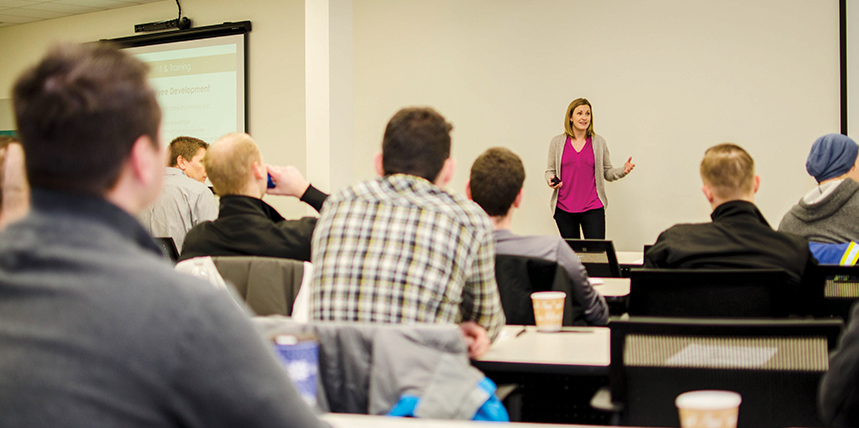With over 15 years’ experience at Magna IV Engineering in Edmonton, AB, Canada, this technician-turned-trainer explains why preserving our legacy knowledge is the best way to keep people safe.
NW: What attracted you to the electrical testing profession?
Balitski: In high school, I excelled in math and physics, so one of my instructors encouraged me to explore engineering. My father was an electronics technician, and I was often in the shop with him when he was fixing things. I’ve always enjoyed working with my hands.
I graduated from the NAIT Electrical Engineering Technology program in 2006. I have always had an interest in the electrical discipline, so I thought the field might be a great place to start my career. I worked full time in the field as a technician for approximately 6 years, then moved to a role that was 50% in the field and 50% in the office for a few more years. Now, I am mostly in the office or on-site delivering technical or safety training — although I do dust off the coveralls every now and again and head back out to the field.
NW: What about this work keeps you committed to the profession?
Balitski: Once I started working on projects, I knew I loved the work. I especially enjoy the experiences and the knowledge that come with the job. I started getting involved in a few of the electrical industry groups and started participating more on committees and boards through my employer as well. Now I am part of several groups that contribute to the electrical industry.
NW: What about this work is specifically challenging for you, and how are you overcoming that challenge?
Balitski: Staying on top of all the technological advancements and staying up to date is always challenging. I have to keep up with new technologies, safety regulations, and new legislation. I stay involved with the emerging technologies by reading technical papers, articles, attending seminars, and conferences. NETA World is a great resource for some of that information. Fortunately, Canada and the United States are technically harmonized in a majority of their regulations and standards.
NW: If you were talking to a young person interested in knowing more about being a technician or having a career in electrical testing, what advice would you give?
Balitski: I would make sure they understood that the job is ever-changing and fast-moving. To be successful in the electrical power testing industry, you need to be flexible and quick-thinking, ready to work hard, and be willing to devote your time. You pay your dues by working long hours in the field, and there’s lots of travel. You must stay on the job until the problem is solved, so it’s important to develop your troubleshooting skills. You must do whatever needs to be done to keep the client happy. The reward is a successful career in a field that we all enjoy.
NW: Describe one of your best workdays…What happened?
Balitski: I am not sure I could pick a particular day, but it is always rewarding to leave a site with a successful energization and a happy client. I’ve had loads of good days. It’s always a good day when no one gets hurt.
NW: What’s it like when a day doesn’t go as planned? How did you respond to those situations?
Balitski: Most days during a maintenance shutdown rarely go exactly as planned, which is why I emphasize the need for quick thinking and flexibility. It is very important to be able to troubleshoot issues as they come up and to be flexible with the demands, schedule, and plan.
NW: How important is ongoing training and professional development in this field?
Balitski: Training and development is where I am currently involved in my career, so I certainly believe it is essential for workers to be properly trained and competent to perform the tasks they are asked to handle. It is an ongoing challenge for any organization to stay up to date with all the new technologies and standards. Since I am involved in developing and delivering training, it is essential that I understand the latest standards and requirements in the industry. Being involved with all aspects of the industry —such as standards, technical information, and safety — helps to keep me updated on all new topics.
You have to take responsibility for your professional development by joining and participating in industry organizations and keeping up with your continuing education credits and standards.
NW: Speaking of training, I saw a photo of you providing training to an all-male audience. What advice do you have for women who are interested in advancing in the electrical power testing profession?
Balitski: I don’t want to be thought of as a female technician or a woman doing her best in a predominantly male industry. I don’t expect any favors or special attention. I want to be thought of in the same way as any other team member.
My advice to women is to be comfortable in your technical competence. Work hard and do your job. It’s the same for both men and women who want to advance in their career. In the electrical testing profession, we are all doing the same tasks. There is nothing in the field that a woman cannot do. There are generally fewer women in the field, but this is a great career for women, with plenty of opportunity to excel.
NW: What are some of the energy trends you believe will affect your work in the future (e.g. EVs, wind, solar, etc.)? How are you preparing for future changes that may be coming your way?
Balitski: Renewable energy and electric vehicles are trends that will continue to evolve in the electrical industry and become much more prominent. Dealing with the unique stresses and operational challenges of an aging electrical infrastructure will highlight the importance of ensuring the reliability of electrical systems. We have to make sure the electrical systems can handle it. Some of our clients are shifting to renewable energy, particularly wind and solar. Therefore, it is critical to stay on top of all the new standards.
NW: As an industry, what do you think should be the No. 1 priority over the next year?
Balitski: The industry focus should always be on improving safety. Safety is always essential and should be given top priority. Complying with the latest electrical safety standards and best practices throughout the industry needs to be top of mind for all organizations. There are lots of tools and resources out there to help with this and keep all workers safe so they can go home and keep doing what they love to do. In my spare time, you will find me out exploring mountains, running races, and spending time with my loved ones. Everyone should be able to return safely to their loved ones at the end of each day.

Balitski says safety is about making sure technicians return to who and what they love at the end of the day.
After safety, the industry needs to look at recruitment and succession planning. We must make sure we are not losing our collective industry knowledge. We need mentorship for passing along that information to the next generation. When I started out in the field, I was working with a smaller group of people and had easy access to the most experienced people. But as a company grows larger, you need a plan on how to pass on that knowledge to the newer people on the team. It’s critical that our industry keeps its legacy knowledge intact.
WANT TO TELL YOUR STORY?
NETA World is looking for technicians, emerging leaders, and industry thought leaders to be featured in our new Insight & Inspiration department. If you know someone who would make a great interview — or if you would like to be interviewed yourself — please contact Carla Kalogeridis at ckalogeridis@netaworld.org.
